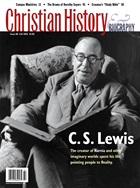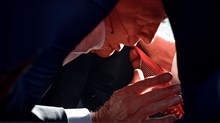Thousands upon thousands of letters written in the hand of C. S. Lewis make up what is now the last original material being published under Lewis's name, much of it for the first time. Written on elegant Magdalen College letterhead (given to him by American friends), scraps of wartime economy paper (of discernibly lower grade than pre- and post-war paper), and thin sheets of typing paper (torn into thirds to get three letters out of one sheet), the letters of C. S. Lewis have accumulated into a monument of Lewis's thought, theology, and charity. One could characterize Lewis's letters as he himself characterized the letters of Charles Lamb: "You'll find his letters as good as his essays: indeed they are almost exactly the same, only more of it."
More of it indeed: At last count, the number of letters collected so far total about 3,400—and they continue to come in. Such a prolific correspondence dispels the image of the isolated bachelor Oxford don, hopelessly out of touch with his times. In fact, few professors could have been more aware of the drift of popular thought and the state of the common cultural soul.
Food for thought
On a given morning, Lewis might write to his publisher, Geoffrey Bles, and haggle over the title of his latest book; he might write a tactful letter to his former pupil John Betjeman, a major poet of the day who still resented his old tutor; or he might write to the American Dr. Firor in thanks of precious wartime food that supplemented the severe British rations.
How greatly, in fact, Lewis admired his American culinary benefactors: "The arrival of that magnificent ham leaves me just not knowing what to say. If it were known that it was in my house, it would draw every housebreaker in the neighborhood more surely than would a collection of gold plate." As Lewis quipped to another generous American, "Every third meal we eat is 'on America.'"
Most letters, however, were from correspondents who wanted Lewis to address a particular theological or personal question, for Lewis had become a touchstone of modern Christian thought in the 1940s and 1950s. The following note to Mrs. Ursula Roberts, a correspondent whom he had never met, shows Lewis's typically direct style:
To Mrs. Ursula Roberts, 31 July 1954:
I am certainly unfit to advise anyone else on the devotional life. My own rules are 1. To make sure that, wherever else they may be placed, the main prayers should not be put "last thing at night." 2. To avoid introspection in prayer—I mean not to watch one's own mind to see if it is in the right frame, but always to turn the attention outwards to God. 3. Never, never to try to generate an emotion by will power. 4. To pray without words [that is, silently] when I am able, but to fall back on words when tired or otherwise below par. With renewed thanks. Perhaps you will sometimes pray for me?
All the hallmarks are there, in a form as condensed as a great moralist could make them: mature theology, practical advice, and simplicity of language.
Alongside the stream of popular inquiries were manuscripts from aspiring poets and novelists (some of whom sent entire works unsolicited) and the usual business correspondence of an academic with other academic friends he rarely saw. ("One's real friends are precisely the people one never gets time to write to," he notes to Dorothy Sayers.)
Sifting through the stack of mail each morning called forth a peculiar versatility in Lewis: He had to turn from matters literary to theological to pastoral in a succession of minutes. One can understand, then, Lewis's picture of the ideal life in Surprised by Joy, where he describes a day with "almost no mail" when he would "never dread the postman's knock."
If this sounds like an exaggeration, it is worth remembering that this picture emerges from at least two hours of answering letters a day for approximately twenty years. If Lewis took a holiday, it only compounded matters upon return. He wrote a remarkable number on Christmas Day itself—and they were not only Christmas cards.
Drudgery and drollery
From a strictly stylistic perspective, what a forge for Lewis's habitually clear expression this daily ritual must have been. To descend from a letter to T. S. Eliot down to a humble London convert and back up to Dorothy Sayers required intense modulation of tone and complexity. In all of Lewis's letters, high or low, the English is translucent, and when he chose to write in French, Anglo-Saxon, Greek, or Latin, no shine is lost.
The hammer of such a routine can be noticed particularly in the successful books where Lewis simply adopts the letter as his literary form: The Screwtape Letters and Letters to Malcolm: Chiefly on Prayer. Something of Lewis's mind worked to the rhythm of the short burst of a letter, with its balanced phrases, its one-off chance to communicate Christian truth in nearly axiomatic sentences.
Lewis did have a devoted secretary, fortunately, to help him with the burden of daily mail. A great deal of the writing was a joint endeavor, in which Major Warren Lewis would type (hunt-and-peck method with two fingers) a full response or simply take down a dictation from his brother. Many letters, in fact—especially those treating current political events—Warren wrote himself and signed "C. S. Lewis."
Drudgery also gave way to drollery at points. "An anonymous postcard," recalled Lewis in 1958, "tells me that I ought to be flogged at the cart's tail for professing to believe in the Virgin Birth. … An unknown American writes to ask me whether Elijah's fiery chariot was really a Flying Saucer. I encounter Theosophists, British Israelites, Spiritualists, [and] Pantheists." One writer even wished to know whether Lewis had traveled to Mars and Venus—a journey that would have been a notable feat for the late 1930s.
The virtue of courtesy
Given that Lewis met what Chaucer terms "God's Plenty" through the post, the question remains: Why would he answer, as he did, every correspondent? Doubtless, Lewis saw his salvation being worked out through relationships, and, from a steady caretaking of Mrs. Moore at the Kilns to the steady correspondence with the faceless thousands, Lewis demonstrated by action what transpires when one human being treats another with attention. Lewis gave theological and intellectual advice through his letters; perhaps more importantly, he also gave his time—generously.
Admirers and detractors almost invariably overlook this virtue of courtesy in Lewis, even though a host of his contemporaries attest to it. Lewis chose to answer all his correspondents, and that deliberate act of the will, repeated and sustained, points to a man who, like the Apostle Paul, would write to the church around the world. For C. S. Lewis knew a great deal more people than the Inklings and his male Oxford and Cambridge colleagues. He knew and cared for women, for the evangelical leaders and laity of his day, for the poor, and for the ordinary Briton who valued his intellectual clarity. In the thousands of letters still being masterfully edited for publication by Walter Hooper, how often the Magdalen don's dip pen ends with the short, perfect, and courteous, "Yours, C. S. Lewis."
Andrew Cuneo is assistant professor of English at Hillsdale College in Michigan.
Meeting children as equals
"Perhaps … you will sometimes say a prayer for me?"By his own admission, C. S. Lewis was shy around children. Perhaps, in part, this was the result of circumstances: For most of his life he was a bachelor (not marrying until he was in his late fifties when his two stepsons were almost teenagers). In spite of limited contact and his own natural reserve, Lewis was nonetheless a caring godfather to the young children of several friends—including Lucy Barfield to whom he dedicated The Lion, the Witch, and the Wardrobe. But even in these instances, his most comfortable connection was usually via the written word.
We see this demonstrated in a letter to his goddaughter Sarah. After explaining why domestic responsibilities will prevent him from being present at her confirmation, Lewis confesses: "If I had come and we had met, I am afraid you might have found me very shy and dull. (By the way, always remember that old people can be quite as shy with young people as young people can be with old. This explains to you what must seem the idiotic way in which so many grown-ups talk to you)."
However, in this same letter to Sarah, Lewis goes on to give warm and practical advice about taking her first communion. Though he might have felt hesitant about his ability to relate to his goddaughter in person, Lewis was careful not to neglect his role as spiritual mentor in her life. But just as significantly, the advice that he gives to Sarah is counsel he could as easily have given to an adult. In other words, in spite of his natural reserve with children, Lewis still met them "face to face" as equals. It is this genuine connection that enabled him to write so effectively for children—whether in creating his seven Narnian tales or in answering a single letter from one of his young readers. Indeed, evidence of this respectful understanding can be found scattered throughout his letters to children.
For example, Lewis responded thoughtfully and without a trace of condescension to the many literary questions of his youthful correspondents, offering helpful insights such as, "A strict allegory is like a puzzle with a solution: a great romance is like a flower you can't quite place." Or, "Of course you're right about the Narnian books being better than the tracts; at least, in the way a picture is better than a map."
He often wrote humorously of his shared love for animals: "Reepicheep in your coloured picture has just the right perky, cheeky expression. I love real mice. There are lots in my rooms at College but I have never set a trap. When I sit up late working they poke their heads out from behind the curtains just as if they were saying, 'Hi! Time for you to go to bed. We want to come out and play.'"
Many of his letters include thoughtful words on spiritual matters: "Yes, people do find it hard to keep on feeling as if you believed in the next life: but then it is just as hard to keep on feeling as if you believed you were going to be nothing after death. I know this because in the old days before I was a Christian I used to try."
And there is always evidence of an honest concern for the individual child: "It makes me, I think, more humble than proud to know that Aslan has allowed me to be the means of making Him more real to you. … Perhaps, in return, you will sometimes say a prayer for me?"
In one of his last letters to a young correspondent, written less than a month before his own death, C. S. Lewis penned these words, words that speak poignantly to each one of us, both child and adult—no matter what our actual age: "If you continue to love Jesus, nothing much can go wrong with you, and I hope you may always do so."
Marjorie Lamp Mead is associate director of the Marion E. Wade Center and co-editor of C. S. Lewis: Letters to Children (Simon & Schuster, 1995).
Copyright © 2005 by the author or Christianity Today/Christian History & Biography magazine.
Click here for reprint information on Christian History & Biography.

Support Our Work
Subscribe to CT for less than $4.25/month





























